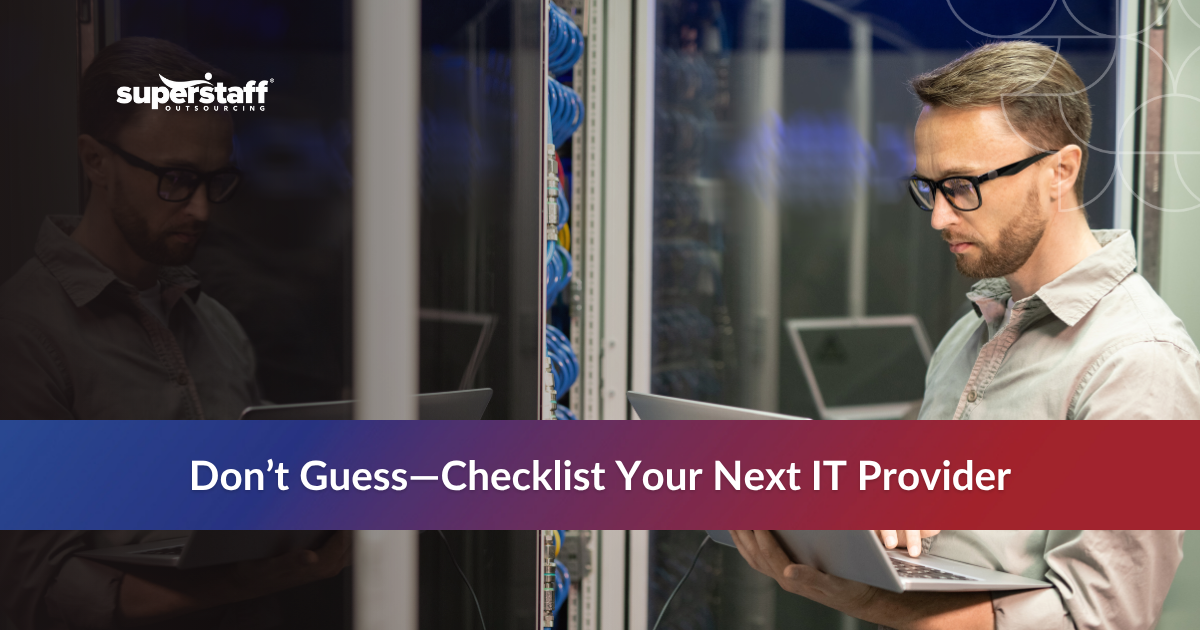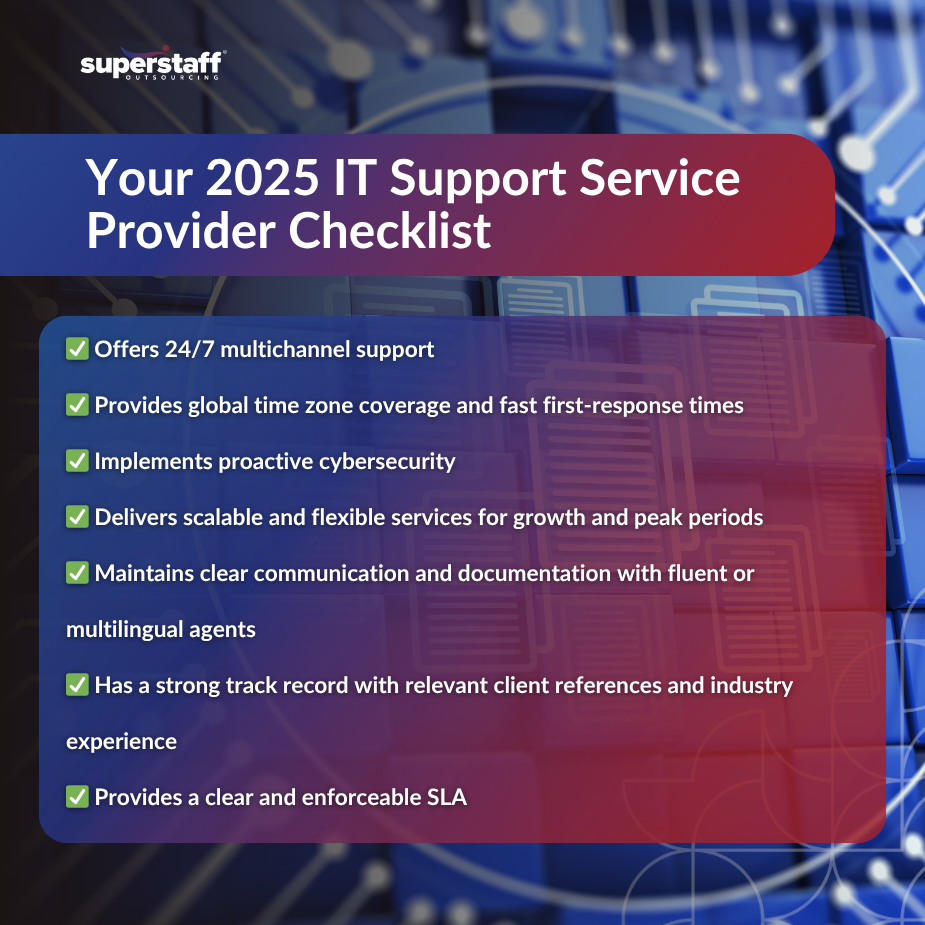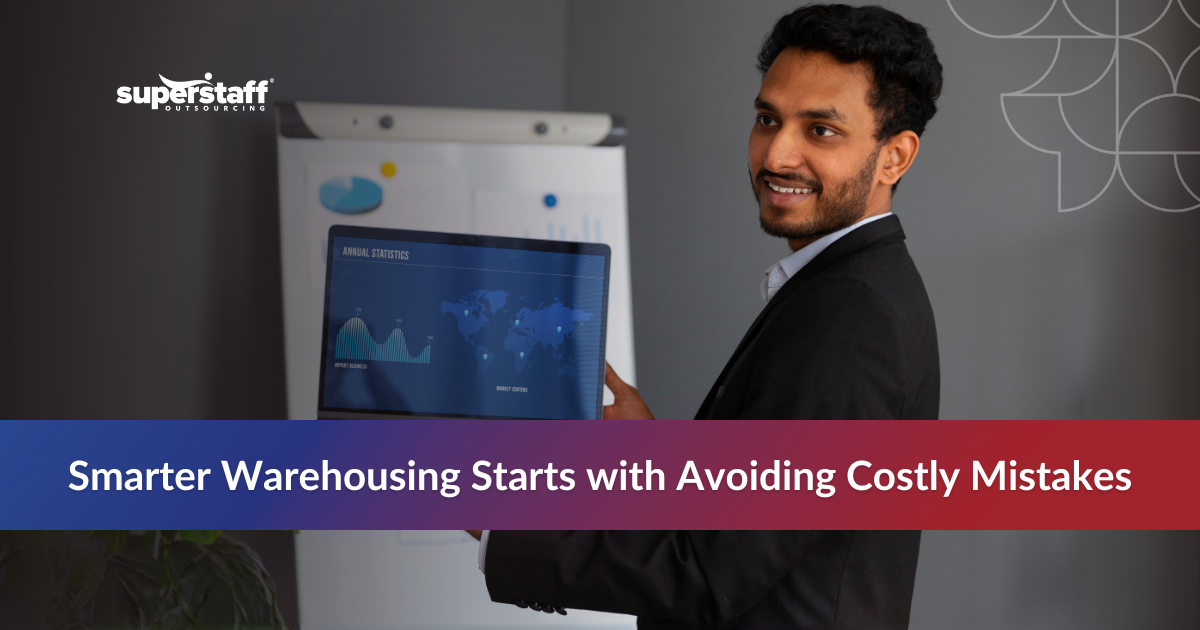
In 2025, the role of a reliable IT support service provider has become more critical than ever. As businesses continue to operate in a hybrid or fully remote environment, the demands on IT infrastructure have intensified. Cyber threats are evolving rapidly, targeting vulnerabilities in everything from cloud systems to employee endpoints. Meanwhile, the average company now relies on a complex mix of SaaS platforms, remote collaboration tools, and legacy systems—making seamless IT support not just a convenience, but a competitive necessity.
Yet with so many vendors in the market, how can you tell which IT support service provider is the right fit for your business? To help you make a confident and informed decision, we’ve created a 2025-ready checklist covering the essential qualities and capabilities you should look for.
Whether you’re outsourcing for the first time or re-evaluating an existing partnership, this guide will walk you through the must-haves in today’s tech-driven business landscape.
1. 24/7 Multichannel Support Capability
In a global digital economy, downtime at any hour means lost revenue.
A strong IT support service provider offers round-the-clock assistance through multiple communication channels, including phone, email, live chat, and ticketing systems. In 2025, the expectation is no longer just to resolve issues quickly but to respond immediately regardless of location or time.
- Time zone coverage is crucial for companies with international teams or customers.
- First-response time benchmarks (e.g., <1 minute for live chat or <1 hour for tickets) are now considered industry standards.
- BPO firms based in regions like the Philippines provide scalable 24/7 support with high English proficiency and strong technical training.
But being always on is just one part—how secure is that support?
2. Proactive Cybersecurity Practices
When creating a checklist for selecting an IT support provider for businesses, one cannot overlook the critical role of cybersecurity.
A good IT partner prevents issues before they happen. As cyberattacks become more sophisticated, businesses must prioritize providers that emphasize threat prevention rather than just reactive fixes.
- Robust endpoint protection and real-time threat monitoring are must-haves.
- Providers should conduct regular patching and vulnerability assessments.
- Look for certifications such as ISO 27001, SOC 2, and compliance with GDPR or HIPAA, depending on your industry.
Security matters—but so does your ability to scale efficiently.
3. Scalability and Flexibility of Services
Whether you’re growing fast or facing seasonal surges, your IT support should keep pace.
Your IT support service provider should adapt to your business needs without friction. The ability to scale up or down seamlessly is a hallmark of a future-ready partner.
- Elastic staffing ensures coverage during product launches, new office openings, or customer onboarding spikes.
- Modular services allow you to pick and choose what you need—helpdesk support, infrastructure monitoring, cloud services, or hardware maintenance.
- Flexible SLAs offered by outsourcing providers let you control cost without compromising performance.
And no matter the scale, the right tools make all the difference.

4. Familiarity With Modern Tech Stacks
Today’s IT support must be fluent in hybrid, cloud, and SaaS ecosystems.
A modern IT support service provider should have hands-on experience with the platforms and systems that power today’s businesses.
- Familiarity with Microsoft 365, Google Workspace, AWS, Azure, and other cloud environments is non-negotiable.
- Support for remote collaboration tools like Zoom, Slack, and Microsoft Teams ensures smooth daily operations.
- Providers should also have expertise in configuring devices, networks, VPNs, and cybersecurity software.
Still, tools are only half the equation—people skills matter just as much.
5. Strong Communication and Documentation Processes
Clear communication prevents small issues from becoming major crises.
The best IT support providers don’t just fix problems—they build relationships by keeping you informed every step of the way.
- Expect regular performance reports, ticket updates, and service feedback sessions.
- Fluent English communication (or multilingual support) ensures clarity across teams.
- Effective escalation protocols and well-defined client feedback loops enhance transparency and accountability.
With solid communication in place, let’s talk about trust.
6. Track Record and Client References
A provider’s history reveals what to expect when problems arise.
Experience speaks volumes when evaluating an IT support service provider. Your provider should demonstrate a strong history of success with businesses like yours.
- Ask for case studies, testimonials, or client references specific to your sector.
- Consider how long the provider has been in operation and their adaptability to industry changes.
- Look for providers with experience in compliance-heavy industries such as finance, legal, or healthcare.
All these points feed into one critical document: the SLA.
7. Service Level Agreement (SLA) Clarity
A strong service level agreement (SLA) is the foundation of a reliable IT support relationship.
Your SLA defines the scope, responsibilities, and expectations from your IT support service provider.
- Key metrics to review include MTTR (mean time to resolution), uptime guarantees, and issue categorization.
- Ensure the SLA includes clear escalation procedures and penalties for non-performance.
- Define exactly what services are covered (and what are not) to avoid misunderstandings later.
So what’s the easiest way to find a provider that checks all these boxes?
Partnering With a BPO That Offers Specialized IT Support and Managed Services
Outsourcing to a BPO with dedicated IT teams is often the most efficient route.
Partnering with a business process outsourcing (BPO) provider that offers specialized IT support gives you access to global talent, best-in-class tools, and dedicated service—without the overhead of managing everything in-house.
- BPOs help reduce costs while maintaining high service quality and round-the-clock availability.
- You can tap into specialized teams for infrastructure support, helpdesk services, cloud migrations, and more.
- Many top BPOs, especially in the Philippines, offer scalable solutions with seamless integration into your existing workflows.
Let’s bring everything together.
Looking for Your Ideal IT Support Service Provider? SuperStaff Is Your Best Bet!
Choosing the right IT support provider in 2025 means going beyond cost—it’s about security, scalability, and service quality.
Use this checklist to assess any potential IT support service provider on critical areas like multichannel support, cybersecurity, scalability, tech expertise, communication, client references, SLA strength, and outsourcing options. The right partner should not only fix problems but help you prevent them, adapt quickly, and support your long-term growth.
Looking for a partner that meets all these standards? It may be time to outsource to the Philippines.
SuperStaff’s outsourced IT support services combine global reach with dedicated service. Reach out to explore how we can support your business’s digital infrastructure.






